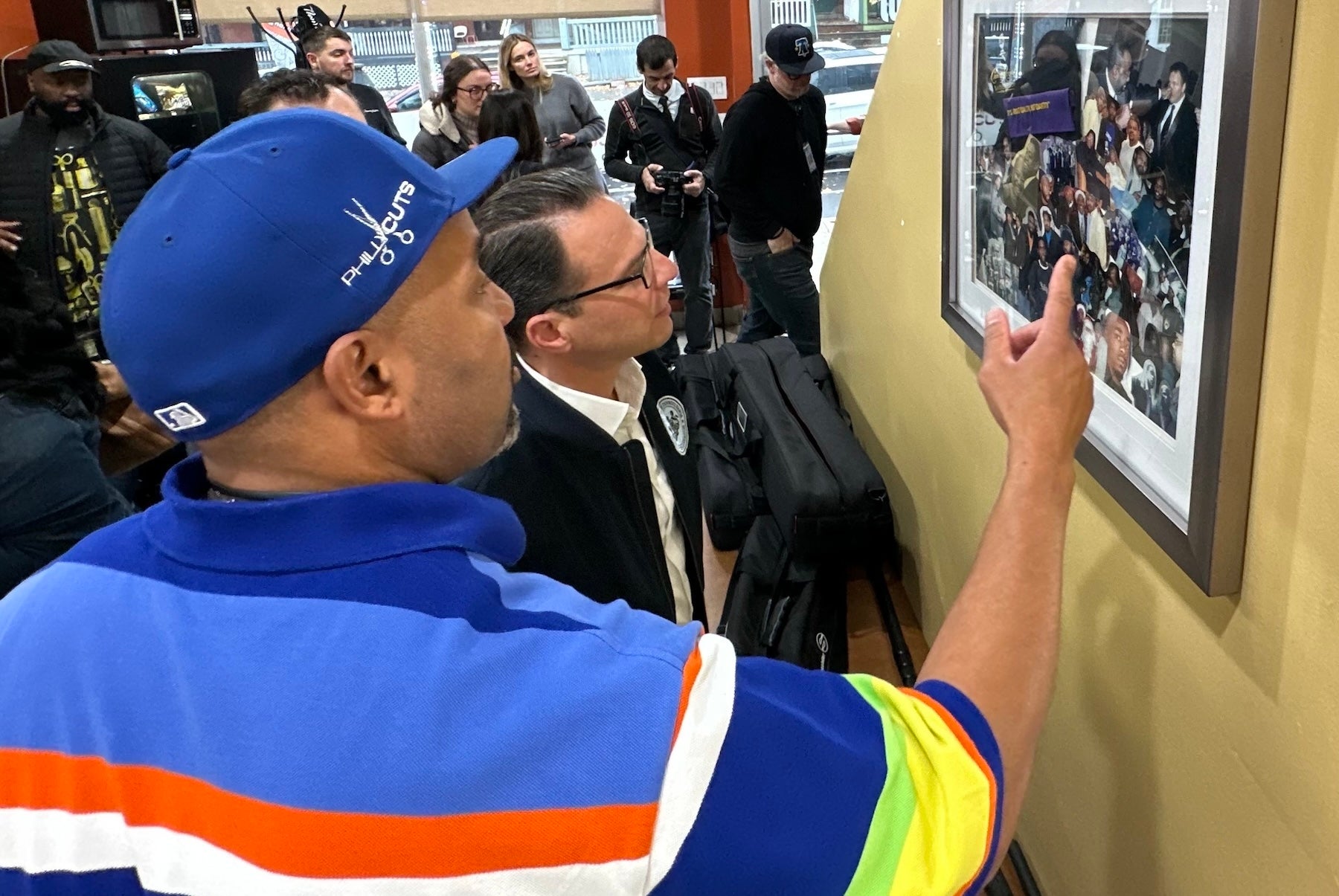Bussiness
Longtime Courtroom Sketch Artist’s Business Is Booming Thanks To Indicted Pols Like Madigan

THE LOOP — Courtroom sketch artist Lou Chukman refuses to have his picture taken.
“I’m philosophically opposed to photography,” he said. “It’s an old neurosis.”
For nearly 50 years, Chukman has churned out colorful sketches of the grim proceedings at the Cook County and federal courthouses, hawking the artwork to TV stations and news agencies.
It’s been a lucrative hustle lately.
In a banner run of high-profile cases, Chukman recently drew the pinstripe suits on convicted Ald. Ed Burke, sold his sketches of Mexican drug kingpin El Chapo’s sons to CNN and now has his eyes on a cash cow in Michael Madigan, the former Illinois House speaker on trial for corruption involving racketeering and bribery.
Opening arguments in the Madigan trial were heard Monday. Chukman stocked extra paper for the occasion.
The old-school artist claims he made more last year than any other in over four decades, with a “comfortable surplus” to boot.
“Half my business is murder, most of the rest is public corruption,” Chukman said. “It’s been an endless flow of crooked aldermen and paychecks.”
Chukman is still in business thanks to a ban on cameras in federal courtrooms and a 2012 Illinois Supreme Court policy that allows cameras in local courts only with the approval of the presiding judge.
There’s also the fact that he is just one of two courtroom sketch artists left in town working regularly.
That’s left Chukman, armed with pencil sharpeners and a tweed jacket, still lingering on the back benches of Chicago courtrooms, producing a court proceeding’s only visuals the original way.
“The job was lucky and it picked me,” Chukman said. “There’s really a James Bond aspect to this. The phone rings. You get a mission from a big organization. You put on a jacket and tie, pick up your briefcase, hop in the car and roar off.”
Crime Pays For A Man ‘Frequently Broke’
The artist, who lives in Pilsen, keeps the originals of thousands of courtroom sketches — of the innocent, the guilty and the in-between — in an indiscriminate Bridgeport storage locker.
The folders date back to 1975. Flipping through the sketches, Chukman, 69, pulled out “a white haired judge with a long face,” an 11-year-old hit man, a row of renegade “super gang” members and former Mayor Lori Lightfoot making a case as a young federal prosecutor.
Before Burke went on trial, there was “partner in slime” Ald. Ed Vrdolyak and dozens of other crooked City Council members coming through the court’s revolving doors, so many that Chukman brags he once got to “draw my own alderman.” The corruption has paid him well.

“You usually have to get indicted for me to draw you,” Chukman said. “I don’t like people.”
Most sketches in Chukman’s storage locker belong to cases that few but him would remember. But the artist finds those proceedings just as relevant.
“I like court because it’s an attempt to make order out of chaos, and ultimately an attempt to make things right,” he said. “Some people don’t get enough time, some may get too much. There’s murderers from 30 years ago that only now get caught, but on the whole, the people they convict really did it.”
DuPage County State’s Attorney Bob Berlin has four of Chukman’s courtroom sketches hanging in his office, stretching back to a double murder at a Chicago bar he prosecuted more than two decades ago.

“Lou seems to use color more often than other artists,” Berlin said. “I keep the sketches because they keep the memory of the trial alive. People need to be reminded of the impact these crimes have on our community, and that there are folks who work hard for justice. I consider Lou a journalist. His sketches capture more than a few paragraphs can.”
Chukman sells custom cartoons to judges and lawyers whenever the news is slow. In the lean summer of 1996, he drew 217 people in a day outside Brookfield Zoo.
Despite recent success, Chukman has been “frequently broke” throughout his career.
“I’ve never been able to figure out exactly what will be newsworthy,” Chukman said. “I always wished I could get a station to take a typical case, a low-grade murder or robbery, go to the bond hearing, go to the probable cause hearing, go to the arraignment, just follow the case, so people can understand why justice is naturally slow. There’s reasons for all sides to be careful.”

‘If I Felt Too Much Sympathy, I Couldn’t Do This Work’
Chukman grew up “compulsively drawing” on the pages of his mothers most expensive books. His parents, immigrants from the former Yugoslavia, gave him a rough upbringing in Little Village, where he was exposed to “a lot of brutality and random cruelty.”
“I couldn’t cross 45th Street without being beat up. Most of the kids decided they didn’t like me and I was an easy target,” Chukman said. “I’m detached from people.”
The artist got a black belt in the Korean martial art of hapkido. His parents wanted him to be a lawyer. He went to art school instead and eventually became an instructor.

Ann “Andy” Austin, a courtroom sketch artist from “the glamorous world of television news,” joined Chukman’s drawing class at the School of the Art Institute of Chicago for a refresher. Chukman’s speedy sketches — honed from years of drawing on his mother’s books — caught Austin’s eye.
Chukman insisted he was just impatient. Austin insisted she needed a summer replacement.
In August 1975, Chukman shadowed Austin to court and drew “a crabby judge” presiding over a prostitution case. Sticking around for summers soon led Chukman to his own client list and assignments from local TV stations.
Instead of becoming a lawyer, he was drawing them.
“Faces are the job,” Chukman said. “Doesn’t matter if it’s happy or sad. I like whoever holds still.”

Chukman has his own renditions of infamous convicts: John Wayne Gacy, R. Kelly, Jussie Smollett, Rod Blagojevich and Donald Trump, whose distinct comb-over was “horrible to draw.” He watched Oprah Winfrey on jury duty and Michael Jordan take a lawsuit over his likeness to the stand. It paid.
He drew disgraced Chicago cops and former gang leaders. He’s seen “grave miscarriages of justice” that have sent innocent people to prison.
But most criminal cases now feel ordinary.
“If the murder weapon was recovered sooner than later, the prosecutor is going to wave it in front of the jury. The defense attorney will stand behind the defendant and put a hand on his shoulder to show he’s not harmful,” Chukman said. “I’ve seen a lot of miserable things: people who lost their loved ones, others sending theirs off to jail forever. If I felt too much sympathy, I couldn’t do this work.”

A ‘Dying’ Industry With Its Highest Demand
The job is tough to stomach and usually harder to make a living on.
Cheryl “Cookie” Cook, the only other courtroom sketch artist still regularly working in Chicago, has seen the industry shrink with a younger crop of judges more agreeable to TV cameras in their courtrooms.
“This business has been dying off for the last ten years,” said Cook, who is also sketching the Madigan trial. “There’s a smaller piece of the pie for anybody who does this.”
Cook considers Chukman more of a fellow survivor than competitor. He’s known to take a blank sheet from the back benches of detention hearings to live-on-air within 20 minutes.

“It’s hard to find artists who want to put up with the pressure of delivering work quickly,” Cook said. “Lou is fast as lightning. And he’s almost like an attorney, the way he’s clued in and reads about cases.”
Longtime Judge Timothy Joyce — who also has Chukman’s work hanging on his office walls — has only twice allowed cameras at his sentencing hearings. He prefers Chukman as a “fly on the wall” and sees the endless discussion around cameras as a “double-edged sword.”
“In one sense, cameras are intrusive for witnesses, jurors, lawyers who don’t want to be on television. In other aspects, cameras can be eye-opening to the general public for how courts proceed,” Joyce said. “But with Chukman, he’ll never draw attention to himself — no pun intended.”
Most local TV stations used to have their own regular sketch artists, Chukman said. But as budget cuts hit the media industry, artists were no longer guaranteed work. Some renegade freelancers started undercutting prices, which “depressed the market for years,” Chukman said.
An industry built on drawing politicians facing their greed was eaten by its own. Many sketch artists died or gave up.

But Cook doesn’t see Chukman slowing down anytime soon. He’s benefitted from a larger roster of freelance clients and an avalanche of high-profile cases, as gang leaders and the profiteers of Chicago’s old political machine finally face the music.
“He has to earn a living. And what else is going to do? Dig ditches?” Cook said. “He knows Chicago is the gift that keeps on giving. This city is notorious for having major court cases.”
Madigan will be another one “terrible to draw,” Chukman said. “He’s got a chameleon face, there’s no good angle for him, no good single defining feature.”
But Chukman can’t complain too much. He’s still working. On one recent weekday, he slammed his storage locker closed and went off to put six sugars in his afternoon coffee.
“I’m actually a sweet guy,” he said.
The artist now sees a bit of humanity in all the dire subjects he has drawn.
“Almost no criminal revels in being a criminal,” Chukman said. “Most have seemed to convince themselves they’re doing this to defend their family, their business, their right to be somewhere. … Everyone has an excuse for what they did, and they’ve convinced themselves of that.”
Listen to the Block Club Chicago podcast:









